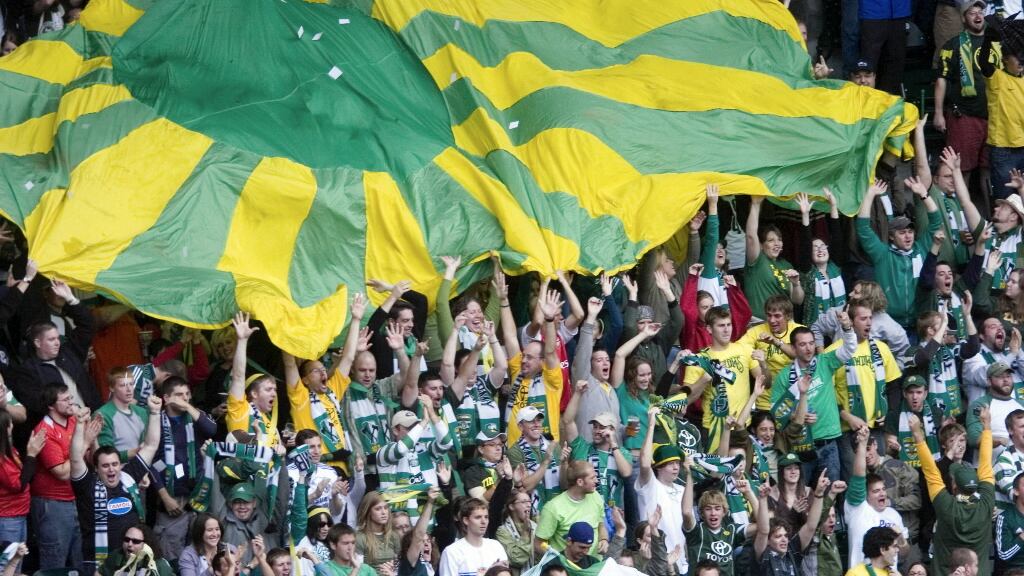For 14 years, raucous fans of the Portland Timbers have engaged in a sentimental tradition: unfurling a large flag depicting a yellow-and-green sunburst, to honor a supporter killed in a traffic accident.
That is, until last month—when the Timbers Army waved that flag in Los Angeles in front of a shocked group of Korean Americans.
Those L.A. fans, gathered in Banc of California Stadium to root for Major League Soccer's Los Angeles Football Club, noticed the resemblance the "Sunshine Flag" bears to the Japanese Rising Sun—the war flag of the Imperial Japanese Navy. For many South and East Asians, that flag is a symbol of World War II atrocities against countries that include China and North and South Korea.

"For that flag to be unfurled and see the light of day in Los Angeles, a city built by immigrants, many of East Asian descent, is horrifying and unacceptable," wrote an LAFC fan organization in a July 19 Instagram post. The Tigers Supporter Group aims "to be the first Korean Supporters Group in all of MLS."
The ensuing furor resulted in a decision by the nonprofit that governs the Timbers Army to retire the flag at the end of this season.
It's also sparked soul-searching, raw feelings and angry outbursts from Timbers fans, who find their tradition at the center of the latest dispute over cultural insensitivity in Portland, a predominantly white city.
"They tried to placate both sides," says Jade Chen, a 24-year-old Taiwanese-American Timbers fan. "I'm definitely in favor of redesigning the flag in 2019, but it's strange to continue flying the flag for the rest of the season."
But other fans are furious at the notion of lowering the flag. "This is a weak decision, bordering on cowardice," wrote one pseudonymous commenter on the nonprofit's website. "Maybe we should change our scarfs from 'No Pity' to 'We're Pussies.'"

The Sunshine Flag dates back to July 14, 2004, when fans first unfurled it at a match. Then nicknamed "the Big Ass Flag," it was, at the time, the biggest "tifo," or stadium art, the Army had yet created.
The design was inspired by beloved mascot "Timber Jim" Serrill, who during games often led the crowd in singing his daughter Hannah's favorite song, "You Are My Sunshine."
The flag took on deeper meaning weeks later, when Hannah was killed in a car accident. The Army then took to singing "You Are My Sunshine" in the 80th minute of every game while waving the flag. The sunburst went on to adorn scarves, hats and banners, and was incorporated into the Timbers Army crest.
But fans of LAFC, which plays near Los Angeles' Koreatown, see it differently.
"To see that symbol, or resemblance to that symbol, unfurled 3 or 4 miles from Koreatown, where our grandparents had to flee because of what was going on under that symbol…it was a very impactful scene on us," says Josh Lee, communications director for the Tigers Supporter Group. "We were pretty outraged."
The 107 Independent Supporters Trust, the nonprofit organization that governs the Timbers Army and is named after the section where the Army sits, said this month it would retire the away-game version of the flag until it could be significantly redesigned. The larger home variation will remain in its current form until the end of the season.
"We will continue to be thoughtful about and sensitive to the issue moving forward," board member Sheba Rawson wrote to WW in an email, "including additional modifications to the home large flag in the offseason."

Serrill—the man to whom the flag is most closely associated—believes the board gave in too easily.
"To say the Sunshine Flag represents the tyranny of the Rising Sun, that's a far stretch," says Serrill, who retired as the team's mascot in 2008. "I'm about spreading the love. I'm about 'You Are My Sunshine.' I don't want Hannah's name connected with offensive symbols. To me, it's ludicrous."
Others applauded the move. "My 2004-era sunshine scarf is possibly my most prized possession, and I still think the 107IST made the right choice to retire the sunshine flag," says fan Aaron Brown. "Frankly, I personally think we could retire it immediately."
Chen says the half measures strike an off note.
"They recognized the symbol and the pain it represents," she says. "If they recognize that enough to stop its usage in 2019, why not stop it immediately? It's a strange decision."
